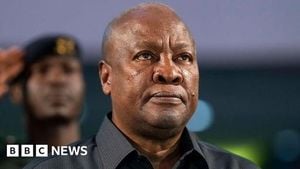The third Brazilian edition of the Web Summit is underway in Rio de Janeiro, running from April 28 to 30, 2025. This year, the event has attracted over 34,000 participants, 1,000 startups, and 100 speakers, solidifying its status as a major hub for innovation and technology in Latin America.
Taking place at the expansive Riocentro, the Web Summit has become a vital meeting point for startups, investors, and companies, fostering connections that could shape the future of technology in the region. This year, the primary focus of discussions is artificial intelligence (AI), particularly addressing ethical challenges, regulatory frameworks, and its impact on the labor market.
Founded in 2009 in Dublin, Ireland, the Web Summit has seen tremendous growth since its inception. After relocating to Lisbon in 2016, it established itself as Europe’s leading technology conference. Today, the event has expanded its reach globally, hosting editions not only in Lisbon and Rio de Janeiro but also in Canada, Hong Kong, Qatar, and with plans for future expansions into India.
At the heart of the discussions this year is AI, a topic that dominated last year's edition. In 2024, the emergence of generative AI sparked excitement, but this year, conversations are shifting towards practical applications and results. Executives are set to showcase how AI is being integrated into their businesses.
The event will feature 14 thematic tracks, covering a wide array of topics such as sustainability, social impact, social network regulation, diversity, fintechs, big data, and new models of digital content creation. Notable speakers include Márcio Aguiar from Nvidia, who will discuss the future of AI, and Priscyla Laham from Microsoft Brazil, who will talk about advancements in AI and sustainable growth.
Nicolas Robinson Andrade from OpenAI will address the responsible use of AI in Latin America and the pressing need for regulation. Justina Nixon-Saintil from IBM will lead discussions on technology's role in social impact and sustainability. Additionally, Kate Conger from The New York Times will analyze Elon Musk's influence on social networks and its implications for U.S. elections.
Other speakers include Gabriela Comazzetto from TikTok and Patrícia Muratori from YouTube, who will discuss emerging content trends on digital platforms, alongside Maren Lau from Meta, who will focus on innovation in social networks. Diego Barreto from iFood will explore digital transformation in the delivery sector, while Diana Ramirez from Spotify will address the future of the creative economy and digital music.
Public figures such as Felipe Neto, Taís Araújo, and Sara Sabry will also participate in discussions centered on inclusion, diversity, and sustainability, adding a rich layer of perspective to the conversations.
Last year’s edition of the Web Summit in Rio marked a pivotal moment for AI discussions, with major companies like IBM, Oracle, and Embraer presenting data on the practical implementation of AI technologies. The 2024 event saw over 30,000 participants and a historic 45% of startups founded by women, showcasing the growing diversity in the tech sector.
This year, the Web Summit Rio 2025 has organized its programming to reflect the pressing dilemmas and trends in global technology and business. Key tracks include Generative AI and Ethics, Digital Regulation, Sustainability and Climate, Diversity and Inclusion, Web3 and Decentralized Finance, Creator Economy, and the Future of Work.
In addition to the main sessions, the event will host over 100 thematic meetups, such as "Women in Tech" and "Data Science Engineers," reinforcing its commitment to diversity and quality networking opportunities. The strong presence of startups at the event is noteworthy, with rapidly growing companies like Trela, Darwin AI, and Curseduca being showcased alongside social impact initiatives such as Food to Save and TutorMundi.
Moreover, the Startup20 initiative, a global startup forum within the G20, will be highlighted, emphasizing Brazil's role in the innovation and social inclusion ecosystem. Investment firms and companies will have dedicated spaces for networking, pitches, and investment rounds, with a particular focus on women-led startups.
Occupying over 100,000 square meters of the Riocentro, the event features specific areas for lectures, meetups, startup exhibitions, and social spaces. Participants can also look forward to the Night Summit, a series of social events occurring throughout the evenings in Rio de Janeiro.
In a noteworthy development, the Web Summit announced an extension of its agreement to hold future editions in Rio de Janeiro for another five years, until 2030. This announcement was made in the presence of Rio’s mayor, Eduardo Paes, who emphasized the city's ambition to become the capital of innovation in Latin America.
As the Web Summit Rio 2025 unfolds, it promises to be a pivotal event that not only highlights technological advancements but also emphasizes the importance of social responsibility and environmental sustainability in the tech industry. The Banco do Brasil (BB) is showcasing its commitment to these values through innovative initiatives like the Árvore BB, an interactive installation utilizing generative AI to engage the public on sustainability ideas.
BB’s participation underscores the integration of purpose-driven innovation and socio-environmental responsibility, essential for building strong employer brands aligned with the evolving market expectations. The BB stand, located in Pavilion 4, offers an interactive experience emphasizing cultural identity and diversity, featuring art installations, open lectures, and mentorship programs aimed at fostering female leadership in technology.
As the event continues, it is clear that the Web Summit Rio 2025 is not just about technology; it's about creating a more inclusive, sustainable future through innovation and collaboration.




